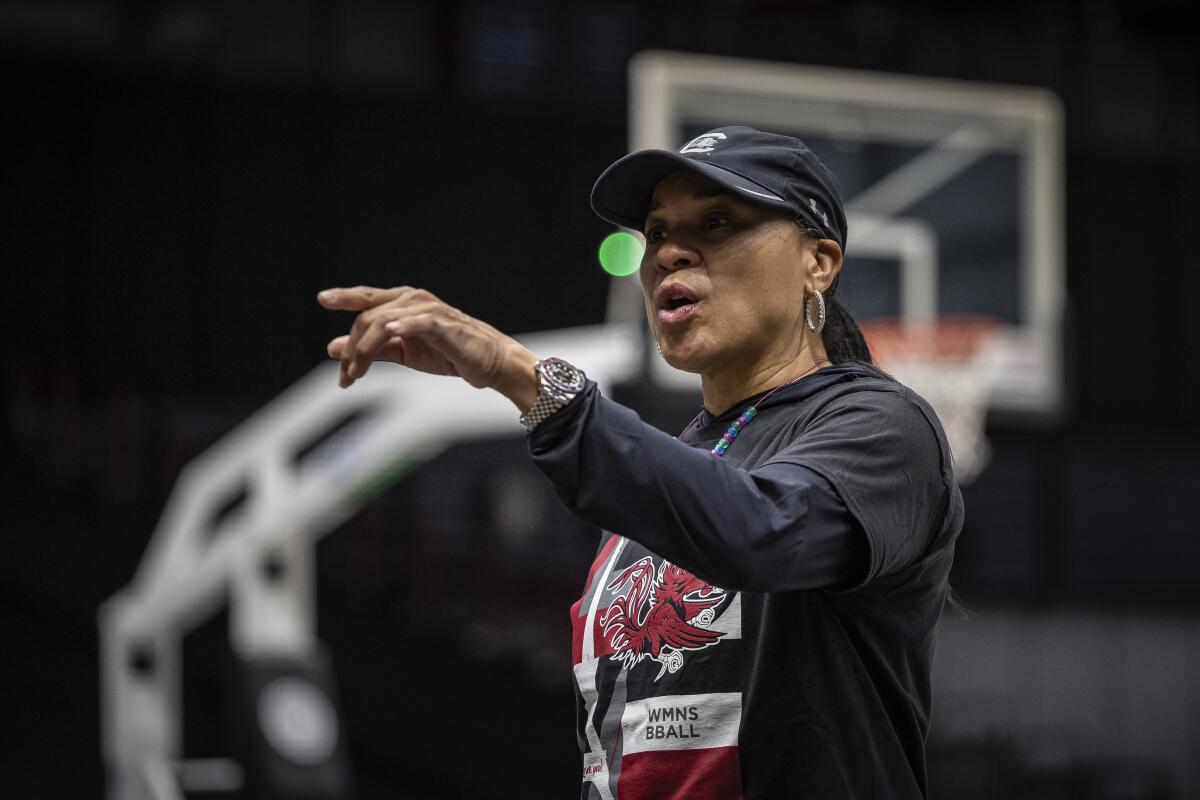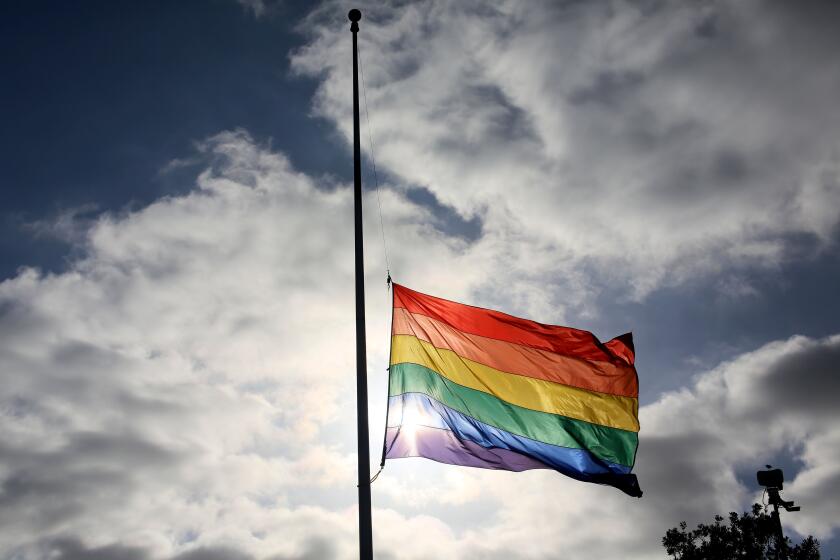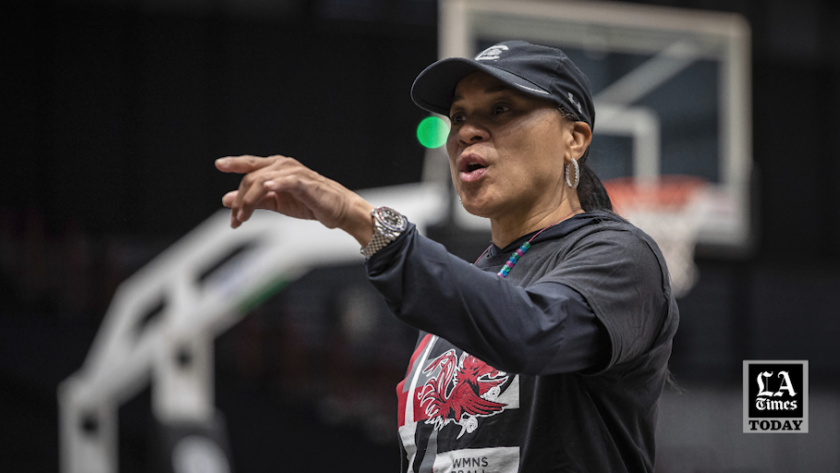Closing the wage gap for Black women is an investment, not charity

- Share via
Dawn Staley has never been shy about talking stats. As a Hall of Fame WNBA player and coach, her numbers are a point of pride. But the figures she is bringing up these days are not — and she thinks we all need to hear them.
Opinion Columnist
LZ Granderson
LZ Granderson writes about culture, politics, sports and navigating life in America.
Among Black women, 40% have annual household incomes of less than $50,000. For Americans over all, the number is just 24%.
Only 43% of Black women have health insurance, compared with 53% of Americans overall.
And although 56% of workers have paid sick leave, only 50% of Black female workers do.
Granderson: U.S. policy basically discourages having kids. Now our economy is paying the price
We’re running out of people who can afford to raise kids without government assistance.
There weren’t many encouraging numbers that came from a recent study by One Million Black Women, a Goldman Sachs initiative that’s investing $10 billion to help address these and other disparities. Staley got involved in the project when she learned about the wage gap — and she hopes that awareness can be a big part of the solution.
“I don’t want laws to put that in place to make it happen,” she said. “I hope deep down the people who are making those decisions see it for what it is. It’s a racial bias and gender bias. I hope they see it and really bring about change. As much as I can scream, I am not a decision maker. I’m just a storyteller, lending my voice to something that should have happened a long time ago.”
Lofty goals are forgotten when startups grow and encounter all-too-familiar pressures and temptations. So much for investing in people.
Watching Staley grow from athlete to coach to change agent has been one of the best stories in sports. Never one to run from a fight, the 5-foot-6 Staley said she brings the same assertive energy from her upbringing in the projects of North Philly everywhere she goes. Whenever there’s an underdog, she’s ready to fight.
That led her to partner with the One Million Black Women project, a collaboration she announced last week. Its goal with that $10-billion commitment is to make a course correction in the American economy and society, for the benefit of everyone. The organization’s data found that reducing the wage gap faced by Black women could increase the nation’s gross domestic product by nearly half a billion dollars and create up to 1.7 million jobs. In other words: It’s not charity; it’s an investment.
A beloved pastor in Alabama killed himself after photos were published online showing him in women’s clothing. The sad story is all too familiar.
“I really don’t know how women do it with kids,” Staley said, noting the cost of child care in addition to lower-than-average wages. “We need to change that.”
Indeed.
Here’s a thought: I know a few men in Congress who could work on two problems at the same time by making child care affordable.
Retirement from Congress wasn’t the only thing on West Virginia Sen. Joe Manchin’s mind last week. He and fellow outgoing Republican Sen. Mitt Romney of Utah introduced a bill that would create a commission to address the nation’s growing debt. That’s the sort of goal that would look more achievable if we added half a billion dollars to the GDP.
Last month the U.S. paid nearly $900 billion in interest as the debt eclipsed $33 trillion. The two moderates went on CNBC together to pitch the commission idea, with Manchin calling the nation’s spending “unsustainable.” During his first speech as House speaker, Rep. Mike Johnson (R-La.) called our debt “the greatest single threat to our nation’s security and stability.”
What’s interesting about that is Johnson’s home state of Louisiana had the largest pay deficit for Black women in the country. This according to the Institute for Women’s Policy Research, which found that Black women are paid about 63 cents for every dollar paid to a white man. The institute also concluded this gap would most likely persist until 2144.
In Louisiana, the median salary of white men is nearly $30,000 more than that of Black women, according to the study. In Utah, where Romney is from, the gap in annual pay is just under $26,000. The gap in Manchin’s state, West Virginia, was $17,000 a year. And of course, there are disturbing wage gaps in every state.
When we’re staring down a national debt of more than $33 trillion, finding long-term opportunities to expand our economic output should not be a partisan issue.
Take manufacturing, for instance. Last year just 20% of Black women earned at least $1,000 a week for full-time employment, while nearly 54% of white men hit that mark. In the manufacturing sector, 80% of Black women are making less than $1,000 a week. Do you know what child care costs these days? It often exceeds $1,000 a month per child. The math just doesn’t work.
You can’t change that kind of systemic financial gap without intent. Betting that things will just get better with time is what allows this disparity to persist. Wishful thinking is what always sustains problems like this.
“It should be a movement,” Staley said. “This is not a call to give Black women a handout. … But when we earned something, we should be paid fairly.”
Employers need to take a hard look at compensation and eliminate racial and gender disparities. Government support for child care is probably also part of the solution, along with other policy changes to support families. For Staley, change starts with helping Americans understand the scope of this problem.
“We have to shed light on this,” she said. “It’s our job to help this movement.”
- Share via
Watch L.A. Times Today at 7 p.m. on Spectrum News 1 on Channel 1 or live stream on the Spectrum News App. Palos Verdes Peninsula and Orange County viewers can watch on Cox Systems on channel 99.
More to Read
A cure for the common opinion
Get thought-provoking perspectives with our weekly newsletter.
You may occasionally receive promotional content from the Los Angeles Times.















